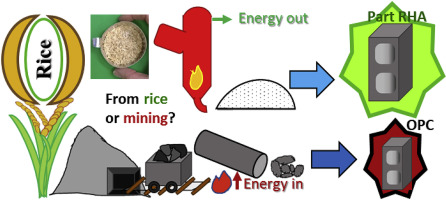This book chapter advances SDG 3 by explaining how gastroparesis is a disorder with slowed or inhibited movement of stomach contents into the small intestine. It has long been recognized that the female gender is more prone to gastroparesis, though the significance of this remains a mystery and has not been completely elucidated.
Over the past five years, we have used data and analytics to help the research and healthcare communities navigate the sea of research and to put collaboration, both interdisciplinary and international, at the heart of scientific progress on the SDGs.
For the first time, we have published graphics covering all SDGs using data and insights from Scopus and SciVal. These graphics show key metrics for research output, collaboration and impact.
After water, concrete is the second most used material in the world. Using life cycle assessments, concrete has typically been found to be 80% of a residential building by weight. Cement production consumes large amounts of energy, motivating a search for sustainable alternatives. Rice husk ash produced in controlled combustion has been found to be a viable replacement for cement. Renewable and sustainable, rice husks have the potential to produce energy while yielding an ash product for use in concrete.
Diagnosis of Alzheimer's disease (AD) is often difficult because of distinct and subjective clinical features, especially in the early stage. FOXO3a protein present in the cognitive centre of brain in inferior temporal region and parahippocampus. FOXO3a can be a potential novel target against AD. AD, Mild Cognitive impairment (MCI) and Geriatric Control (GC) were recruited after diagnosis by clinical assessment, MRI, TauPET and FDG-PET. We have quantified serum FOXO3a by surface plasmon resonance (SPR) and compare with TauPET between of AD, MCI patients and GC.
Background: The current coronavirus disease 2019 (COVID-19) pandemic has put an enormous stress on the mental health of frontline health care workers. Objective: Psychiatry departments in medical centers need to develop support systems to help our colleagues cope with this stress.
While the number of medical human rights programs has increased, there is substantial unmet need for forensic evaluations among asylum seekers throughout the United States. From September 2019 through May 2020, the Mount Sinai Human Rights Program has coordinated pro bono forensic mental health evaluations by telephone or video for individuals seeking protected immigration status who are unable to access in-person services. The national network clinicians conducted 32 forensic evaluations of individuals in eight U.S. states and Mexico seeking immigration relief.
Objective: Mental health and cognitive difficulties are highly prevalent across neurological disorders and significantly contribute to poorer patient outcomes. Unfortunately, access to effective psychological services for these comorbidities are limited. To determine whether a novel transdiagnostic internet-delivered psychological intervention, the Wellbeing Neuro Course, was feasible, acceptable and efficacious a single-group feasibility open trial was employed. Methods: The Wellbeing Neuro Course, targets mental health and cognitive difficulties, across a variety of neurological disorders.
Background: Alcohol use disorder is a highly prevalent disease with multiple medications available for treatment. The overall prevalence of patients receiving pharmacotherapy is believed to be low and the characteristics and comorbidities that affect receipt are not well-established. Methods: We created a dataset from Truven Health Analytics MarketScan Commercial Claims and Encounters Database of patients with an outpatient encounter for alcohol abuse or dependence in 2014.
Background: In humanitarian contexts, ensuring access to safe, nutritious, good quality and culturally appropriate food in the right quantity at the right time and place during an emergency or a protracted crisis is an enormous challenge, which is likely to increase given uncertainties such as climate change, global political and economic instability and emerging pandemics like COVID-19. Several international organizations and non-government organizations have well established systems to respond to food security emergencies.


